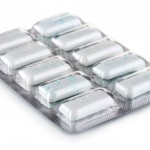
The presence of Streptococcus mutans is strongly associated with dental caries so preventive measures targeting these micro-organisms may be helpful in reducing the global burden of caries. Sugar free gum may provide oral benefits as it stimulates salivary flow facilitating oral clearance and can deliver xylitol and sorbitol which have bacteriostatic properties.
The aim of this review was to assess the impact of sugar-free gum on the level of oral micro-organisms, specifically Streptococcus mutans.
Methods
Searches were conducted in the Allied and Complimentary Medicine Database (AMED), Cochrane Central Register of Controlled Trials (CENTRAL), Cochrane library of systematic reviews, Embase, Medline, Open Grey, Prospero, PsychINFO, Scopus and Web of Science databases. Randomised controlled trials (RCTs), crossover trials, pre-post trials, pre-post one arm trials, post-only trials and any design with a comparative arm published in English were considered. Two reviewers independently screened and selected studies, extracted data and assessed risk of bias using the Cochrane domain-based tool and meta-analysis undertaken.
Results
- 13 studies (11 RCTs) reported in 14 papers were included.
- None of the studies were at low risk of bias in all domains with 7 at high risk of bias and 6 at unclear risk.
- 12 of the 13 studies used xylitol.
- Meta-analysis (13 studies) found that sugar free gum use significantly reduced the load of Streptococcus mutans compared to all controls:-
- effect size = – 0.42 (95%CI; – 0.60 to – 0.25)
- For xylitol studies only studies only:-
- effect size = – 0.46 (95%CI; – 0.64 to – 0.28).
Conclusions
The authors concluded: –
Chewing sugar free gum reduces the load of Streptococcus mutans in the oral cavity in comparison to non-chewing controls. Considering the degree of variability in the effect and the moderate quality of the trials included, there is a need for future research exploring the use SFG as a preventive measure for reducing the cariogenic oral bacterial load.
Comments
The authors have undertaken a broad database search for relevant studies although non-English language studies were excluded. As almost all of the studies were RCTs (11 out of 13) consideration could have been given to restricting the inclusion criteria to RCTs. Of the included studies all but one related to Xylitol which needs to be taken into consideration when interpreting the findings. While the findings do indicate that Streptococcus mutans levels are reduced by the use of sugar free gum this does not necessarily translate into an obvious clinical benefit. Although the same authors reported on the impact of sugar free gum on dental caries (Dental Elf – 24th Jan 2020) indicating there was evidence to support its use for caries reduction.
However, none of the studies included in these two reviews were considered to be at low risk of bias there are also unanswered questions in relation to the dosage of xylitol gum and the length of use. Persistence of effect may require long-term usage so compliance and potentially cost may be relevant for prevention at an individual or population level. Other issues such as side effects, environmental concerns, school policy objections and a perceived risk of chocking also need to be taken into consideration.
Links
Primary Paper
Nasseripour M, Newton JT, Warburton F, Awojobi O, Di Giorgio S, Gallagher JE, Banerjee A. A systematic review and meta-analysis of the role of sugar-free chewing gum on Streptococcus mutans. BMC Oral Health. 2021 Apr 29;21(1):217. doi: 10.1186/s12903-021-01517-z. PMID: 33926448; PMCID: PMC8082871.
Other references
Dental Elf – 24th Jan 2020
